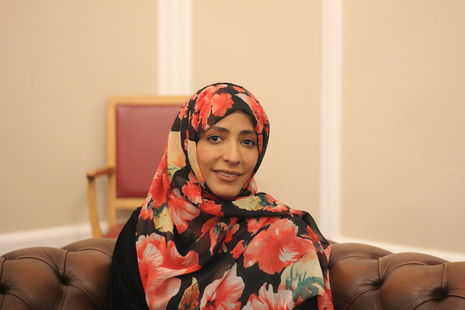Tawakkol Karman: “The world needs the courage of young people”
Raphael Korber-Hoffman speaks to human rights activist Tawakkol Karman about the struggle for democracy in the Middle East so far, and what is yet to come

In 2011, human rights activist Tawakkol Karman became the first Arab woman, and second Muslim woman, to receive the Nobel Peace Prize, which catapulted her to become one of the world’s most renowned human rights activists. From Yemen, Karman has been at the forefront of protest movements since 2005, when she led protests in her home country for greater press freedom.
A convincing optimist, Karman spoke to me about the powerful role she believes young people can play in reshaping the world through embracing human rights and democratic values. She told me that young people have always been the focus of her activism, such as when she organised student rallies in 2011 against the Yemeni dictator Ali Abdullah Saleh. “The world needs the courage of those people, the young people. The world needs [young people’s] energy. The world needs their soul and their kindness because those young people don’t carry all the mistakes that the oldest carry.” Recalling the events of the Arab Spring, Karman notes how “the ones who have toppled the regimes of dictatorships [are] the young people. Because they knew their role and they knew their duty and they decided to carry their responsibility for their kids, for … all coming generations.” Connecting the role of the youth to saving the climate, Karman also spoke of her admiration for climate change activists, saying she “believes that they will succeed in their battle.”
“Women have these challenges twice: as journalists and citizens that suffer from tyranny, and women that suffer from bad traditions and customs"
Tawakkol also recalled the difficulties not just of being a protestor in pre-2011 Yemen, but of being a female one. She argues that “women also have these challenges twice, as journalists and citizens that suffer from tyranny, and women that suffer from bad traditions and bad customs, and those bad traditions and customs also produced by the dictators. The dictators don’t want women to be involved in public life.” Having toppled the dictatorship in Yemen, she adds “we took these rights as women first, and as a citizen next … we guaranteed the woman’s right as a constitutional right.”
With the far-right making a comeback around the world, it can be difficult to keep a positive mindset regarding global politics in 2020. For Karman, there is always time for hope. Part of this is due to her long-term view of democratisation. The Arab Spring revolutions of 2011 are seen by some to have disappointing outcomes. Egypt, having initially removed long-time dictator Hosni Mubarak in 2011, is now back into dictatorship following a military coup in 2013, and Yemen and Syria are in the midst of conflicts which have caused huge numbers of casualties and shocking human suffering. Other protests, such as those in Bahrain, were brutally repressed. Karman argues, however, that “when we started our peaceful revolution, our Arab Spring, we didn’t expect that the dictators would give up smoothly, and will receive us with flowers.” She adds “We, Arab people, toppled 8 dictators through ten years … In Yemen, in Egypt, in Tunisia, in Libya, and now in the second wave of the Arab Spring in Algeria, in Sudan. It’s 7 dictators … And you know who … Gaddafi, Ben Ali, Abdullah Saleh, Hosni Mubarak, al-Bashir, Bouteflika. Decades, forty years of ruling, the least one of them is 23 years.” She added, “we are just in the first step.”
Peaceful protestors "should believe that at the end they will win the battle with less cost"
Karman is also convinced of her non-violent methods, making the point that “those dictators they can play very well in violence. It’s their field and their battle. So, always, they win.” Peaceful protestors “should believe that at the end they will win the battle with less cost and more guaranteed outcomes.”
Nevertheless, Karman acknowledges the difficulties that the Arab Spring revolutions have faced, difficulties she puts down to the “counter-revolution led by the monarchies that surround us.” Specifying Saudi Arabia, the United Arab Emirates and Iran, she argues “they don’t want democracy and they are afraid from our winning. And also, our winning is just our first step, just the first step of our revolution. Because the goal was not to remove the dictators. No, the goal was building new states, democratic states that respect human rights that practice accountability, rule of law.”
"The goal was building new states, democratic states that respect human rights, that practice accountability"
Asked whether she also holds Western powers such as the UK, US and others accountable for the atrocities which have occurred particularly in Yemen, Karman agrees. She calls for those in the West to “stop selling weapons to those tyrannies”. The responsibility of Western nations goes further however, and Karman raises the point that through recognising or welcoming dictators such as al-Sisi or Mohaxmmed bin Salman, they are granted legitimacy “and encouraging [them] to do more crimes”, giving the example of murdered journalist Jamal Khashoggi. In Syria, too, Karman made the point that “the Western countries let down the people’s demands for freedom.”
Whilst war still rages in Karman’s native country, her work in Yemen and beyond acts as an example to all that being brave enough to stand up and take a stand will have an impact in making the world a better place, even if the toppling of a dictator is only the beginning of a long and arduous journey towards freedom. The world today is a frightening and oppressive place for many. But, as Karman encouraged in her speech at the Cambridge Union, “this darkness will not last.”
 Features / Beyond the porters’ lodge: is life better outside college?24 February 2026
Features / Beyond the porters’ lodge: is life better outside college?24 February 2026 News / Cambridge academics sign open letter criticising research funding changes22 February 2026
News / Cambridge academics sign open letter criticising research funding changes22 February 2026 Theatre / Footlights Spring Revue? Don’t Mind if I Do!25 February 2026
Theatre / Footlights Spring Revue? Don’t Mind if I Do!25 February 2026 Fashion / The evolution of the academic gown24 February 2026
Fashion / The evolution of the academic gown24 February 2026 News / Cambridge and Manchester Universities meet for innovation partnership26 February 2026
News / Cambridge and Manchester Universities meet for innovation partnership26 February 2026










![How to Create an Attractive Freelancer Portfolio [5 Tips & Examples]](https://www.varsity.co.uk/images/dyn/ecms/320/180/2026/02/vitaly-gariev-ho2tNOWZYXM-unsplash-scaled.jpg)